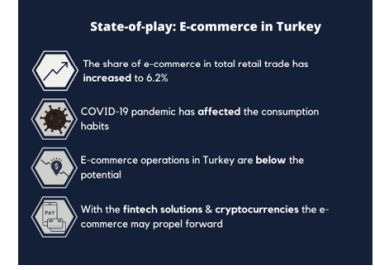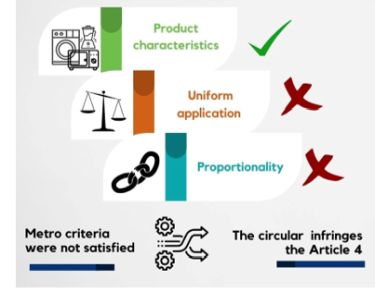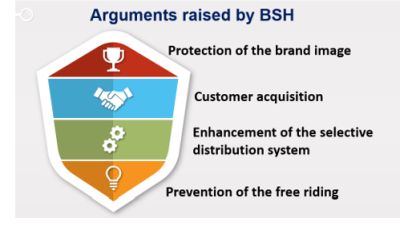1. INTRODUCTION
On 8 February 2022, the Turkish Competition Authority ("TCA") has rendered its BSH decision1 ("the Decision"), in which it rejected BSH Ev Aletleri Sanayi ve Ticaret A.Ş.'s ("BSH") negative clearance / individual exemption request for its distribution agreements entirely banning authorized resellers' sales on e-marketplaces. The decision provides insight into the development of e-commerce in Turkey and includes extensive references to case law in the EU and Turkey on online sales restrictions. It also highlights the reasons why suppliers may be inclined towards banning online resales through e-marketplaces.
In this article, we will briefly explain the Board's assessment regarding online sales restrictions, specifically under two sub-topics, which are i) banning sales on dealers' own websites; ii) banning sales on e-marketplaces. We will also touch upon Board's findings on the e-commerce sector in Turkey.
2. BACKGROUND OF THE DECISION
BSH is an undertaking active in the production and distribution of domestic appliances (such as washing machines and refrigerators) and small household gadgets (such as vacuum cleaners) in Turkey. Its brands consist of Bosch, Siemens, Profilo, and Gaggenau, the first three of which are distributed in Turkey through authorized dealers member to its selective distribution system. In addition, BSH distributes its products through "electromarkets" (such as MediaMarkt and TeknoSA), which are not included in the selective distribution system per se. Yet, as the electromarkets still must abide by some qualitative criteria set by BSH, TCA accepted that selective distribution system is implemented for the electromarket channel as well.
Although agreements with the dealers did not entail any restriction regarding internet sales (on both dealers' own websites and e-marketplaces), a circular note completely banned authorized resellers' sales of BSH products on Amazon, N11, Trendyol, Morhipo and Hepsiburada. BSH mainly argued that the ban of sales in e-marketplaces has the objectives of (i) brand image protection, (ii) prevention of free-riding, and (iii) enhancement of distribution efficiency. The circular note also made it clear that contravening this prevention may lead to the termination of the dealership agreement on justified grounds.
Hence, BSH has asked the TCA to assess whether BSH's implementation of banning sales on e-marketplaces falls within the protective cloak of the Block Exemption Communiqué No. 2002/2 on Vertical Agreements ("Communiqué No. 2002/2") or, if not, satisfies the conditions for an individual exemption as per Article 5 of the Law No. 4054 on the Protection of the Competition ("Law No. 4054").
3. WHAT IS THE REACH OF THE E-COMMERCE SECTOR IN TURKEY?
The TCA provides a detailed analysis of the e-commerce sector and its development in Turkey. Main points addressed by the TCA are provided below:

- Whereas the share of retail e-commerce in total retail trade in Turkey was 1.3% in 2013, this ratio increased to 6.2% as of the end of 2019. Still, this value is quite low compared to developed countries.
- While trade through the traditional channel has been adversely affected by the COVID-19 pandemic, it is seen that consumers have been attracted to e-commerce.
- The change in consumer habits in favor of e-commerce due to the COVID-19 pandemic may create a domino effect in other e-commerce areas and the transformation may become permanent.
- The number of businesses active in e-commerce has increased by 275% in 2020.
- Compared to countries with similar development levels, the share of e-commerce in trade services remains limited in Turkey, and therefore, operations are currently well below the potential.
- The reasons behind such sluggishness is the fact that large-scale retailers started their e-commerce activities relatively late, whereas SMEs still struggle with adapting their businesses to the cyberspace.
- Especially with the increase in the number of fintech companies and with the launch of new payment solution products, it seems quite possible that payment platforms independent of banks will gain weight.
- Increasing popularity of blockchain technology-based cryptocurrencies on a global scale is among the signs that e-commerce will gradually expand its scope in the years to come.
4. THE BOARD'S ASSESSMENT OF INTERNET SALES RESTRICTIONS
The TCA starts its analysis with a market definition exercise. Considering the differentiation of the subjected products in the eyes of consumers, especially in terms of their usage purposes and qualities, the relevant market is defined on a product basis and separately as; "oven, refrigerator, washing machine, dishwasher, deep freezer, dryer, bagged vacuum cleaner, bagless vacuum cleaner, hot beverage, food preparation and electrical cooking product groups". TCA comments that the market is competitive but moderately concentrated, with six players representing 90% of market shares.
Following that, TCA provides a background information with respect to the selective distribution systems. Under the Article 3 of the Communiqué No. 2002/2, selective distribution systems are defined as:
"a distribution system whereby the provider undertakes to sell directly or indirectly, the goods or services which are the subject of the agreement, only to distributors selected by it, based on designated criteria, and whereby such distributors undertake not to sell the goods or services in question to unauthorized distributors."
In selective distribution systems, prohibiting an authorized reseller from selling to end users, in an active or passive manner, is regarded as a hardcore restriction. As per the paragraph 25 of the Guidelines on Vertical Agreements ("Guidelines"), internet sales are deemed passive sales, and their complete ban may run contrary to the block exemption's safe harbor. On the hand, suppliers have the incentives to prevent resellers from operating over the internet, on the grounds of concerns related with brand image, free-riding, counterfeiting, inadequacy of the pre- and post-sales services or loss of the control over the product.
Here, the TCA divides the type of internet sales restrictions into two: i) banning sales on dealers' own websites; ii) banning sales on e-marketplaces.
4.1. Assessment on the Ban of Internet Sales on Dealer's Own Website
As mentioned, the restriction, by a supplier, of distributors from making sales on their own websites is a type of passive sales restriction. Having said that, the supplier can set qualitative standards for the use of the internet as a sales channel. According to the "equivalence principle", the criteria set for internet sales do not have to be the same as the criteria for the traditional distribution channel but should at least be comparable.
In other words, although internet sales cannot be prohibited completely, still certain restrictions may apply, such as web site design requirements. However, these limitations cannot go so far as to constitute a de facto ban on internet sales. On the other hand, prohibiting the sales of goods on e-marketplaces presents a more complicated picture, which corresponds to the case at hand.
In its assessment, the Board refers to the Pierre Fabre2 and Guess3 decision of European Court of Justice ("EUCJ"); Bang et Olufsen4, Ping5, Stihl6, Bikeeurope7 decision of Autorité de la concurrence; Rome Medical8 decision of CMA, Emmajilunga9 decision of Polish Competition Authority. In cited decisions, it has been evaluated that the prohibition of sales on internet sales restrict competition by its object. Arguments regarding the requirements of the product type, product safety, protection of brand image, and prevention of free riding were not accepted.
TCA's precedent on prohibition of internet sales are provided below in the chronological order:
| TCA Decision | TCA's Assessment |
| Antis (05.05.2008; 08-32/401-136) | TCA evaluated that the prohibition on internet sales does not significantly impede intra-brand competition, and existing inter-brand competition is found to be at a sufficient level. TCA has granted an individual exemption for 5 years. |
| Yatsan (23.9.2010; 10-60/1251-469) | TCA assessed that the complete prohibition of the sale of Tempur branded products over the internet does not meet the requirement in the Article 5 (d) of the Law No. 4054. TCA has sent opinion letter ordering the cease of related implementations. |
| BSH I (22.08.2017; 17-27/454-195) | TCA stated that prohibitions of internet sales may also materialize de facto by redirecting the visitors of a distributor's website to that of the supplier, or by active discouragement. TCA did not accept the argument in favor of protection of brand image. |
| Jotun (15.2.2018; 18-05/74-40) |
TCA stated that there is a disproportion between the restriction imposed and the aim sought to be achieved, and that an absolute restriction cannot be evaluated within the framework of individual exemption conditions when there are less restrictive methods. TCA has sent an opinion letter ordering the revision of the related agreement provisions. |
| Yataş (6.2.2020; 20-08/83-50) | TCA has evaluated that the internet restrictions cannot benefit from the individual exemption on the grounds that they do not meet the first condition, therefore TCA did not find it necessary to evaluate the remaining exemption conditions. TCA has sent opinion letter ordering the cease of related implementations. |
| Baymak (26.3.2020; 20-16/232-113) | TCA decided that the restrictions cannot benefit from the block exemption. In addition, TCA did not grant the individual exemption as the products subject to the agreement are not of the type for which a justification can be claimed for the restriction of sales over the internet. |
4.2. Assessment on the Ban of Internet Sales on E-Marketplaces
E-marketplaces offer consumers a search cost advantage, while at the same time increasing transparency and providing the opportunity to compare products, services and prices. In terms of suppliers, they provide the opportunity to reach more consumers at the same time and to benefit from the already existing infrastructure of the e-marketplaces for services. In addition, increased transparency exerts a downward pressure on prices and contributes to the development of both intra-brand and inter-brand competition. According to the surveys conducted by the TCA, dealers prefer to sell on e-marketplaces rather than on their own websites and they are of the opinion that they will lag behind their competitors, if they do not sell through e-marketplaces.
In the jurisprudence of the EU member states, it is seen that there are different approaches to the de facto implementation of the restriction of sales through e-marketplaces, in contrast to the case-law on the restriction of sales from the dealer's own website. In this context, the TCA examines whether sales bans on e-marketplaces (i) infringes the Article 4 of the Law No. 4054, (ii) benefit from the block exemption, (iii) satisfies the individual exemption criteria.
4.2.1. Restriction of Sales On E-Marketplaces Infringes the Article 4 of the Law No. 4054

TCA starts its assessment by recalling the Bundeskartelamt decisions10, which in common do not accept such restrictions as a proportionate solution to protection of brand image, prevention of free-riding etc. On the other hand, the Coty decision11 of EUCJ allows for the restriction of sales on e-marketplaces within the scope of selective distribution systems. However, the TCA does not find it clear how the Coty decision will be interpreted in terms of other products.
Following that, TCA cites the Metro decision12 of EUCJ when assessing the legality of the selective distribution systems. Accordingly, selective distribution systems are lawful if they satisfy three conditions: i) the characteristics of the products in question must necessitate a selective distribution system; ii) authorized dealers should be selected based on objective criteria that apply across the board without discrimination; and iii) restrictions inherent in the system should be proportionate (appropriate to achieve the envisaged aim).
- Although TCA does not qualify BSH's products as luxury products, it has acknowledged that a selective distribution system may be necessary because the products are technologically complex and their design plays a key role in shaping consumer choice, which necessitates the cultivation and protection of a sound brand image. That leads the TCA to conclude that the first criterion is fulfilled.
- However, the second criterion (uniform application of the selection criteria to all authorized dealers without discrimination) is not fulfilled. At first sight, it is true that the circular note prohibits the sale of products on e-marketplaces for all distributors and is therefore not discriminatory. Still, "electromarkets" such as Teknosa and MediaMarkt maintain their sales positions in e-marketplaces, leading to the conclusion that the restrictions do not apply in a uniform manner within the selective distribution system.
- Third, the TCA looks specifically at the proportionality criteria, relying heavily on Coty decision. Although TCA states that sales ban on e-marketplaces may enhance the luxury image in the eyes of the consumer, BSH's products have not been found appropriate for such an interpretation. In addition, TCA stated that the arguments of BSH in favor of restriction are not based on concrete grounds in terms of meeting the proportionality criteria.
As a result, the TCA concludes that the restrictions subject to the application do not enable BSH to protect the interests of its purely selective distribution system. Hence, TCA concluded that the restriction of sales on e-marketplaces infringes the Article 4 of the Law No. 4054. The TCA further analyzes whether they can benefit from the block exemption regulation or whether an individual exemption can be granted.
4.2.2. How Did BSH Defend the Sales Ban on E-Marketplaces?

Within the scope of its application, BSH has provided a detailed explanation of the drawbacks or negative consequences of sales made through e-marketplaces. In addition, a number of authorized dealers also supported the prohibition, citing concerns ranging from free riding to the benefit of e-marketplaces, to "excessive" competition exerting a powerful downward pressure on prices. These arguments will be briefly examined below:
Brand image
BSH argues that following factors may lead to an impairment of a brand's image:
- Intra-site communication system, which does not enable BSH to prevent the sale of products with misleading information,
- Delays in resolving consumer problems,
- Problems experienced in delivery and return processes,
- Presence of unauthorized sellers in e-marketplaces, which impairs the selective distribution system of BSH,
- Use of nicknames by sellers in marketplaces, which creates a lack of transparency over the identity of a given seller,
- Products of all ranges are sold concomitantly, side-by-side, including lower quality ones,
- Some e-marketplaces offer additional products and services alongside the BSH product, such as extended warranty or insurance services, with no exhaustive knowledge and without informing BSH.
Counterfeiting
BSH expresses its concern that counterfeit products risk damaging consumer trust and loyalty, as well as incurring significant costs. TCA states that suppliers raise the argument that they will take the blame if consumers receive a counterfeit product. Also, it is argued that only authorized sellers are permitted the use the brand images of the products.
Customer acquisition
Consumers shopping on e-marketplaces are bound to remain primarily as the customer of the e-marketplace and not the supplier. This has implications not only from the traditional contours of customer acquisition, such as building trust and establishing connections, but also from novel perspectives, most importantly data. Indeed, BSH argues that it will not be able to collect and process customer data, leading to lost opportunities of personalization and market surveillance.
Decrease in the distribution efficiency
The selective distribution system established by BSH ensures that the products produced or supplied by BSH are retailed at the same quality throughout Turkey. However, BSH has no means of controlling, intervening or sanctioning, both legally and de facto, the sales conducted on e-marketplaces, with which it has no commercial ties.
Free riding concerns
BSH argues that it continuously invests in the selective distribution system it has established, makes various improvements to provide and maintain a quality experience to its customers, opens physical stores with experiencing opportunities, provides remote access trainings to sales consultants, and works to maximize customer loyalty. However, sales made by e-marketplaces and third-party sellers, which do not contribute to maintaining BSH's brand image, corporate identity and customer loyalty, create a free-riding problem.
4.2.3. Restrictions May Not Benefit From The Communiqué No. 2002/2
The block exemption provisions stipulate that the safe harbor will not apply to agreements containing hardcore restrictions. In selective distribution systems, prohibiting authorized sellers from selling their products to end users in an active or passive manner results in a hardcore restriction.
Whereas internet sales are considered as passive sales, TCA assessed that the fact that BSH completely restricts sales on e-marketplaces without any qualitative criteria, is contrary to the "equivalence principle" and discourages buyers from using the internet as a distribution channel. It is considered that the restrictions in question are heavily constraining by nature and remove the agreement from the scope of the block exemption due to the fact that the members of the selective distribution system are prohibited from conducting active and passive sales to end users. Hence, TCA stated that the restrictions may not benefit from the protective cloak of Block Exemption Communiqué No. 2002/2.
4.2.4. Restrictions Do Not Satisfy Any of The Conditions of Individual Exemption
As known, for an agreement to benefit from individual exemption, four cumulative criteria need to be satisfied, namely, there should be: i) an improvement on the production or distribution of products; ii) consumer benefit derived from the said improvement. In addition, iii) competition should not be eliminated in a significant part of the market, and iv) the restriction of competition should not go further than what is necessary to achieve the first two aims.
- Regarding the first criterion, BSH mainly argues that purported efficiencies stemming from the agreements essentially equate to (i) the protection of brand image and (ii) strengthening of the distribution system. However, the TCA refuses these arguments. TCA states that, it is not clear whether brand image can be protected by banning e-marketplace sales. BSH argues that consumers may be misinformed and consequently lose trust in BSH brands if sold on e-marketplaces. However, TCA relies on evidence that consumers know how to differentiate between the sellers and marketplaces, and consequently know whom they should hold accountable. Secondly, protecting brand image via banning e-marketplace sales seem to be out of touch with industry reality. Indeed, many competitors of BSH actively encourage their sellers to go online, which is reported to have boosted the visibility and ultimately the profitability of their businesses.
- Moreover, the TCA answers the free riding concerns of BSH in detail. Firstly, it considers that the free riding problem mainly concerns authorized sellers rather than BSH itself. Lastly, the TCA states that the free riding problem goes for both channels. TCA establishes that, just as it is possible for consumers to visit physical stores and decide to purchase online, it is also common for them to prefer another physical store. Therefore, the TCA assesses that the argument of the protection against free riding does not go beyond a speculation.
- Second, the TCA turns towards the evaluation of whether there exists any consumer benefit stemming from the restrictions in question. Considering the increasing number of consumers using e-commerce in general and e-marketplaces in particular, TCA stated that these restrictions fall far beyond of consumer benefits. Moreover, TCA explains that an important purpose of the restrictions on internet sales is to prevent price competition. As a result, TCA ascertains that the prohibition in question would harm, rather than benefit, consumers.

- Third, the TCA analyzes whether competition in a significant part of the market would cease because of the agreements. Here, the TCA adopts one of the arguments put forward by e-marketplaces – namely, the risks of a potential "domino effect", whereby smaller competitors follow BSH in restricting e-marketplace sales. In other words, if allowed, BSH can induce its competitors to also prohibit e-marketplace sales, which would reduce overall (inter-brand) competition as a collectivized impact.
- Lastly, the TCA expresses that the restrictions in question limit competition in an excessive manner, and they are not appropriate to achieve the objectives envisaged by BSH, namely the elimination of free riding and the protection of brand image. Whereas e-marketplaces already implement a number of functions to tackle concerns related to consumer satisfaction and brand image, BSH tried to alleviate its concerns with implementing an outright ban on e-marketplaces without exploring these possibilities. Also, the TCA stated that, banning e-marketplace sales may constitute a part of a broader strategy of controlling the resale prices of authorized sellers.
Hence, TCA concluded that the circular does not satisfy any of the conditions of individual exemption set out in the Article 5 of the Law No. 4054 and rejected the request of BSH concerning sales bans on e-marketplaces.
5. CONCLUSION
We expect this decision to become a guidance to the undertakings in many other sectors. The practical approach adopted by the TCA in resolving the case is remarkable, the reasoning is founded upon both comparative and empirical studies. Dedicated surveys have been carried out to determine the idiosyncrasies surrounding the case, ranging from the degree of eagerness of numerous distributors to sell online, to the preferences of consumers when it comes to purchasing domestic appliances on the internet. Furthermore, the TCA makes extensive reference to the decisional practice in various member states in a comparative manner, such as Germany, France, Poland etc. However, it is noteworthy that the TCA's approach is closer to that of Bundeskartellamt than of the EUCJ.
Still, it is not clear how the decision would have taken shape under different circumstances. For example, the fate of agreements that limit (but not completely forbid) sales on e-marketplaces for luxury products (as in the Coty decision of EUCJ), with all-encompassing restrictions across the board (e.g., including electromarkets) remains to be seen. This Decision is significant as it provides the TCA's first detailed assessment regarding online sales bans on e-marketplaces following the revision of the Guidelines in 2018, which is more "pro e-marketplace" compared the EU practice.
Footnotes
1. The Decision can be accessed at the following link: https://www.rekabet.gov.tr/Karar?kararId=a937082b-551b-472e-9673-792142e416ad (last accessed on February 22, 2022)
2. Pierre Fabre, Case C-439/09 [2011].
3. Guess, Case AT. 40428 [2019].
4. Autorité de la Concurrence, Bang et Olufsen, Decision no 12-D-23.
5. Competition and Markets Authority, Golf Equipment, Case 50230 [2017].
6. Autorité de la Concurrence, Stihl, Décision no 18-D-23 [2018].
7. Autorité de la Concurrence, Bikeurope, Décision no 19-D-14 [2019].
8. UOKIK, Emmaljunga, RGD 2/2015 [2015].
9. Competition and Markets Authority, Roma Medical, CE/9578-12 [2013].
10. Bundeskartellamt, Asics, B2-98/11 [2015]; Bundeskartellamt, Adidas, B3-137/12 [2014]; Bundeskartellamt, Sennheiser, B7-1/13-35 [2013].
11. Coty, Case C-230/16 [2017].
12. Metro I, Case C-26/76 [1977].
The content of this article is intended to provide a general guide to the subject matter. Specialist advice should be sought about your specific circumstances.




